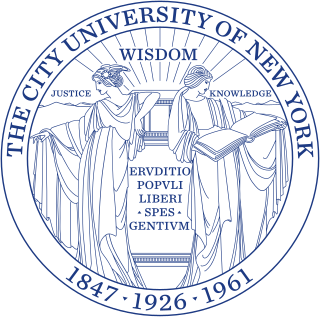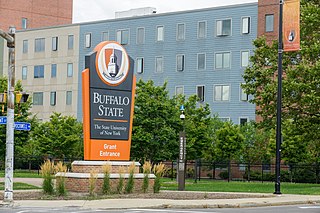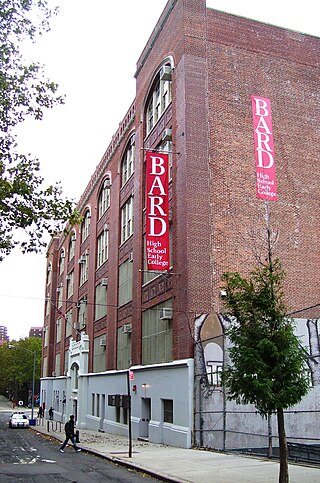Related Research Articles

The City University of New York is the public university system of New York City. It is the largest urban university system in the United States, comprising 25 campuses: eleven senior colleges, seven community colleges, and seven professional institutions. While its constituent colleges date back as far as 1847, CUNY was established in 1961. The university enrolls more than 275,000 students and counts thirteen Nobel Prize winners and twenty-four MacArthur Fellows among its alumni.

Brandeis University is a private research university in Waltham, Massachusetts. Founded in 1948 as a non-sectarian, coeducational institution sponsored by the Jewish community, Brandeis was established on the site of the former Middlesex University. The university is named after Louis Brandeis, the first Jewish Justice of the U.S. Supreme Court.

Brooklyn College is a public university in Brooklyn in New York City, United States. It is part of the City University of New York system and enrolls over 17,000 undergraduate and over 2,800 graduate students on a 35-acre campus as of 2019.

The State University of New York at Purchase, commonly referred to as Purchase College or SUNY Purchase, is a public liberal arts college in Purchase, New York. Established in 1967 by Governor Nelson Rockefeller in 1967, SUNY Purchase is one of 13 comprehensive colleges in the State University of New York (SUNY) system.

Applied science is the use of the scientific method and knowledge obtained via conclusions from the method to attain practical goals. It includes a broad range of disciplines such as engineering and medicine. Applied science is often contrasted with basic science, which is focused on advancing scientific theories and laws that explain and predict natural or other phenomena.

The State University of New York Buffalo State University is a public university in Buffalo, New York. It is part of the State University of New York (SUNY) system. Buffalo State University was founded in 1871 as the Buffalo Normal School to train teachers. It offers 79 undergraduate majors with 11 honors options, 11 post baccalaureate teacher certification programs, and 64 graduate programs.

The State University of New York at Albany, commonly referred to as the University at Albany, UAlbany or SUNY Albany, is a public research university with campuses in Albany, Rensselaer, and Guilderland, New York. Founded in 1844, it is one of four "university centers" of the State University of New York (SUNY) system.

The State University of New York at Oneonta, also known as SUNY Oneonta, is a public university in Oneonta, New York. It is part of the State University of New York (SUNY) system.

The State University of New York at Farmingdale is a public college in East Farmingdale, New York. It is part of the State University of New York. The college was chartered in 1912 as a school of applied agriculture under the name of New York State School Of Agriculture on Long Island. As of the fall semester of 2016, Farmingdale State College had an enrollment of 9,237.

Westchester Community College (WCC) is a public community college in Valhalla, New York, in Westchester County. It is part of the State University of New York (SUNY) system.
Critical pedagogy is a philosophy of education and social movement that developed and applied concepts from critical theory and related traditions to the field of education and the study of culture.

Bard High School Early College (BHSEC) is an early college school, with multiple campuses in the United States. The school allows students to begin their college studies two years early, graduating with a Bard College Associate in Arts degree in addition to their high school diploma. Students complete their high school studies in the ninth and tenth grade, after which point they begin taking credit-bearing college courses under the same roof. Unlike some dual-enrollment programs, students stay on the same campus for all four years, and both high school- and college-level courses are taught by the same faculty. Teachers at the Bard High School Early Colleges are both certified public school teachers as well as experienced academic scholars, often holding terminal degrees in their areas of study.

The University at Buffalo School of Law is a graduate professional school at the University at Buffalo. Founded in 1887, and affiliate with Niagara University until 1891, it is the State University of New York (SUNY) system's only law school. U.S. News & World Report ranks the University at Buffalo School of Law 94th (tied) in the nation for 2022. The University at Buffalo School of Law is No. 1 in Thomson Reuter's "Super Lawyers" ranking of law graduates practicing in Upstate New York, which includes 54 of the 62 counties in New York State. This is in addition to the UB Law School's 2010 national ranking, where it placed 48th out of the 180 law schools in the country that produced Super Lawyers, a measure which examines "twelve indicators of professional achievement". Also, Malcolm Gladwell, in the New Yorker Magazine, devised a formula that ranks UB within the top 50 whereas Reuters ranks UB Law as 48th overall in the nation.
Cooperative learning is an educational approach which aims to organize classroom activities into academic and social learning experiences. There is much more to cooperative learning than merely arranging students into groups, and it has been described as "structuring positive interdependence." Students must work in groups to complete tasks collectively toward academic goals. Unlike individual learning, which can be competitive in nature, students learning cooperatively can capitalize on one another's resources and skills. Furthermore, the teacher's role changes from giving information to facilitating students' learning. Everyone succeeds when the group succeeds. Ross and Smyth (1995) describe successful cooperative learning tasks as intellectually demanding, creative, open-ended, and involve higher-order thinking tasks. Cooperative learning has also been linked to increased levels of student satisfaction.

Roosevelt University is a private university with campuses in Chicago and Schaumburg, Illinois. Founded in 1945, the university was named in honor of United States President Franklin Delano Roosevelt and First Lady Eleanor Roosevelt. The university enrolls around 6,000 students between its undergraduate and graduate programs. Roosevelt is home to the Chicago College of Performing Arts.

Metropolitan College of New York (MCNY), formerly Audrey Cohen College, is a private college in New York City. MCNY is accredited by the Middle States Commission on Higher Education and consists of three schools: The Audrey Cohen School for Human Services and Education, the School for Public Affairs and Administration, and the School for Business.
Audrey C. Cohen was the founding president of Metropolitan College of New York, a non-profit, private institution known for its unique curricular structure and commitment to experiential education. An educational visionary, activist, and social entrepreneur, Cohen was convinced that people learn best when they approach their learning with an immediate, concrete purpose directed at improving the world. The college she founded continues today to provide students with a "Purpose-Centered" education that enables them to work towards a degree while developing their skills as counselors, business managers, teachers, community organizers, and human service providers.

George Sylvester Counts was an American educator and influential education theorist.
Human services is an interdisciplinary field of study with the objective of meeting human needs through an applied knowledge base, focusing on prevention as well as remediation of problems, and maintaining a commitment to improving the overall quality of life of service populations. The process involves the study of social technologies, service technologies, and scientific innovations designed to ameliorate problems and enhance the quality of life of individuals, families and communities to improve the delivery of service with better coordination, accessibility and accountability. The mission of human services is to promote a practice that involves simultaneously working at all levels of society in the process of promoting the autonomy of individuals or groups, making informal or formal human services systems more efficient and effective, and advocating for positive social change within society.

Joan Straumanis is an academic administrator, philosopher, second-wave feminist, mathematician, civil libertarian, public speaker, and American pioneer in women's studies. She co-created the first women's studies program outside a public university, and served as president of both Antioch College and the Metropolitan College of New York and as academic dean at other institutions.
References
Citations
- 1 2 Roosevelt, Grace (2015). Creating a College That Works. New York: SUNY Press. pp. 107–131.
- ↑ "MCNY Student Handbook" (PDF). pp. 37–39. Retrieved November 11, 2021.
- ↑ "Purpose Centered Education" (PDF). Retrieved November 11, 2021.
Works cited
- Ardovini, Joanne. & Anne Lopes (April 2009). "Teaching Social Justice: A Proposal to Innovate the Liberal Arts Core", Theory in Action, Volume 2:2.
- Grace G. Roosevelt, Creating a College That Works: Audrey Cohen and Metropolitan College of New York , SUNY Press, 2015.